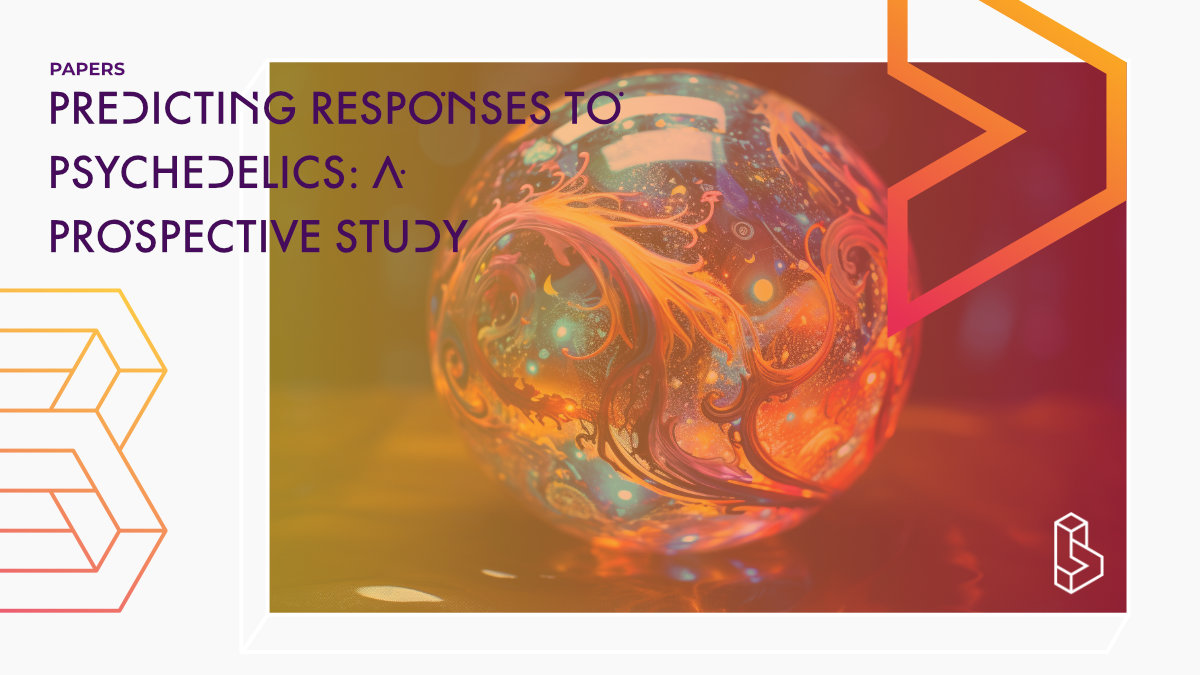This longitudinal survey study (n=654 > 535 > 379 > 315 > 212, with increasing dropout) gathered data from individuals at five different time points before and after they undertook a preregistered psychedelic experience, and assessed variables related to personality traits, intentions, and the set and setting to predict the acute effects of taking the psychedelic, as well as long-term outcomes of subjective well-being. Baseline trait variables, such as absorption, strongly influenced long-term well-being. However, acute variables such as the intention and intensity of having mystical experiences also positively influenced well-being up to four weeks after the psychedelic experience.
Abstract of Predicting responses to psychedelics
“Introduction: Responses to psychedelics are notoriously difficult to predict, yet significant work is currently underway to assess their therapeutic potential and the level of interest in psychedelics among the general public appears to be increasing. We aimed to collect prospective data in order to improve our ability to predict acute- and longer-term responses to psychedelics.
Methods: Individuals who planned to take a psychedelic through their own initiative participated in an online survey (www.psychedelicsurvey.com). Traits and variables relating to set, setting and the acute psychedelic experience were measured at five different time points before and after the experience. Principle component and regression methods were used to analyse the data. Sample sizes for the five time points were N = 654, N = 535, N = 379, N = 315, and N = 212 respectively.
Results: Psychological well-being was increased 2 weeks after a psychedelic experience and remained at this level after 4 weeks. Higher ratings of a “mystical-type experience” had a positive effect on the change in well-being after a psychedelic experience, whereas the other acute psychedelic experience measures, i.e., “challenging experience” and “visual effects”, did not influence the change in well-being after the psychedelic experience. Having “clear intentions” for the experience was conducive to mystical-type experiences. Having a positive “set” as well as having the experience with intentions related to “recreation” were both found to decrease the likelihood of having a challenging experience. The baseline trait “absorption” and higher drug doses promoted all aspects of the acute experience, i.e., mystical-type and challenging experiences, as well as visual effects. When comparing the relative contribution of different types of variables in explaining the variance in the change in well-being, it seemed those baseline trait variables had the strongest effect on the change in well-being after a psychedelic experience. These results confirm the importance of extra-pharmacological factors in determining responses to a psychedelic.
Discussion: We view this study as an early step towards the development of empirical guidelines that can evolve and improve iteratively with the ultimate purpose of guiding crucial clinical decisions about whether, when, where and how to dose with a psychedelic, thus helping to mitigate risks while maximizing potential benefits in an evidence-based manner.”
Authors: Eline C. H. M. Haijen, Mendel Kaelen, Leor Roseman, Christopher Timmermann, Hannes Kettner, Suzanne Russ, David Nutt, Richard E. Daws, Adam D. G. Hampshire, Romy Lorenz & Robin L. Carhart-Harris
Summary of Predicting responses to psychedelics
The volume of clinical research on serotonergic psychedelics has increased within the last decade, and recent results suggest that diverse clinical populations can benefit from psychedelics. However, little progress has been made in our ability to predict individual responses to a psychedelic.
The use of psychedelics to treat major psychiatric disorders is becoming increasingly well recognized, but it is also relevant to consider their effects in the general population.
Previous studies have found that the level of apprehension before taking psychedelics is negatively correlated with the pleasantness of the subsequent experience and willingness to repeat it. Similarly, anticipatory anxiety predicts acute anxiety during a psychedelic experience.
Notes on Predicting responses to psychedelics
A follow-up by Mans and colleagues (2021) investigates the 2-year follow-up data and grouping of themes of well-being.
Find this paper
Predicting responses to psychedelics: a prospective study
https://doi.org/10.3389/fphar.2018.00897
Open Access | Google Scholar | Backup | 🕊
Cite this paper (APA)
Haijen, E. C., Kaelen, M., Roseman, L., Timmermann, C., Kettner, H., Russ, S., ... & Carhart-Harris, R. L. (2018). Predicting responses to psychedelics: a prospective study. Frontiers in pharmacology, 897.
Study details
Participants
654
Humans
Authors
Authors associated with this publication with profiles on Blossom
Mendel KaelenMendel Kaelen is a neuroscientist and entrepreneur, researching and developing a new category of psychotherapeutic tools for care-seekers and care-providers. Mendel has researched the incomparable effects of music on the brain during LSD-assisted psychotherapy. His work has determined how LSD increases enhanced eyes-closed visual imagery, including imagery of an autobiographical nature. This gives light to how music can be used as another dimension in helping psychotherapists create the ideal setting for their patients.
Leor Roseman
Leor Roseman is a researcher at the Centre for Psychedelic Research, Imperial College London. His work focussed on psilocybin for depression, but is now related to peace-building through psychedelics.
Chris Timmermann
Chris Timmerman is a postdoc at Imperial College London. His research is mostly focussed on DMT.
David Nutt
David John Nutt is a great advocate for looking at drugs and their harm objectively and scientifically. This got him dismissed as ACMD (Advisory Council on the Misuse of Drugs) chairman.
Robin Carhart-Harris
Dr. Robin Carhart-Harris is the Founding Director of the Neuroscape Psychedelics Division at UCSF. Previously he led the Psychedelic group at Imperial College London.
Institutes
Institutes associated with this publication
Imperial College LondonThe Centre for Psychedelic Research studies the action (in the brain) and clinical use of psychedelics, with a focus on depression.
Linked Research Papers
Notable research papers that build on or are influenced by this paper
Sustained, multifaceted improvements in mental well-being following psychedelic experiences in a prospective opportunity sampleThis survey (n=654 start; n=64 end) found that those who used psychedelics (by themselves; naturalistic observational study) improved in 'being well' and 'staying well', but found no changes in 'spirituality'. The study ran for two years and also measured the well-being of the participants before, two weeks after, and four weeks after the experience.

